Companies to Watch: Celebrating Google's Black Founders Fund
Representation in tech isn’t a recent issue, but it is recently receiving a lot more deserved attention. Some notable progress has been made, but there’s still plenty of room to do more — despite being one of the fastest-growing entrepreneur groups around the world, Black founders received less than one percent of all venture capital globally in 2020.
In New York and across other regions of the US, Google for Startups is addressing that gap.
This month, Tech:NYC hosted a welcome event for the local cohort of Google’s Black Founders Fund, where we convened New York-based recipients of the Fund’s non-dilutive grants and mentorship with Brooklyn Borough President Eric Adams.
Alongside our own Julie Samuels and Google’s Director of Engineering Marcus Mitchell, the Borough President lauded the founders not only for the tools they’re building, but for the changemakers they will be for their immediate communities, their city and the tech sector at-large:
“This is such a powerful moment. And so here's my calling to you. I want you to look at how we deliver goods and services in this city, and the unfairness of doing so, and help me reinvent and reimagine this city,” Adams said.
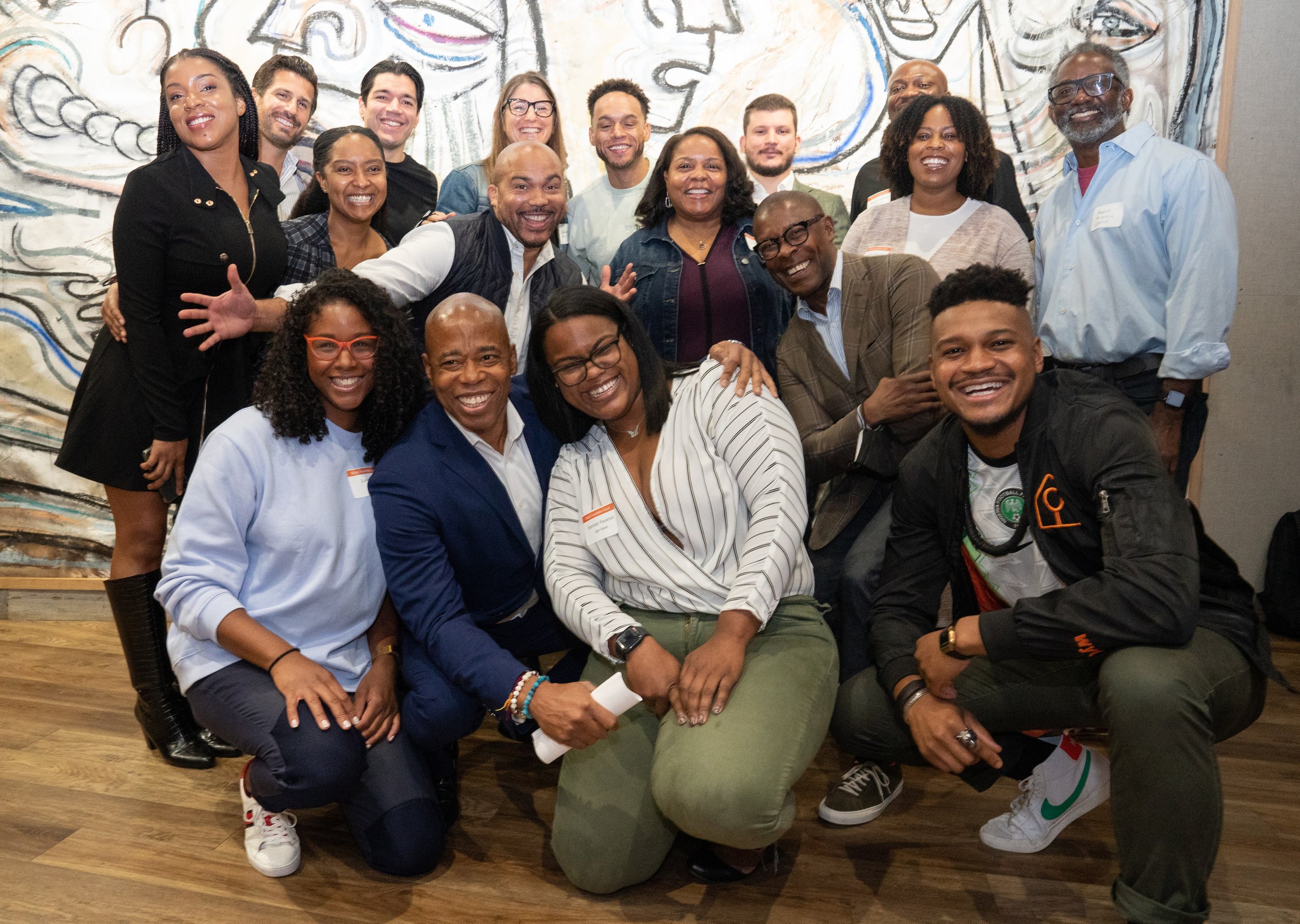
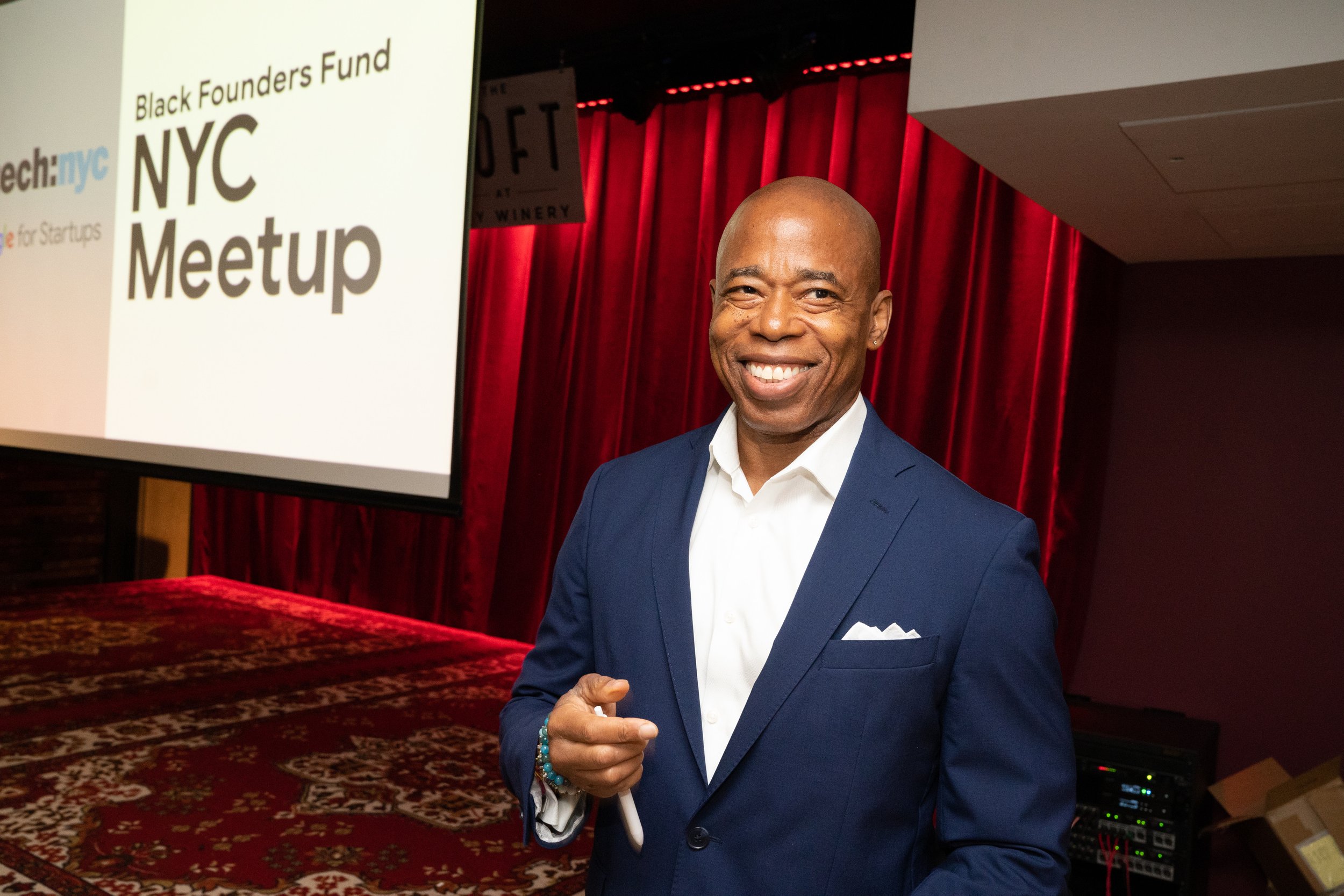
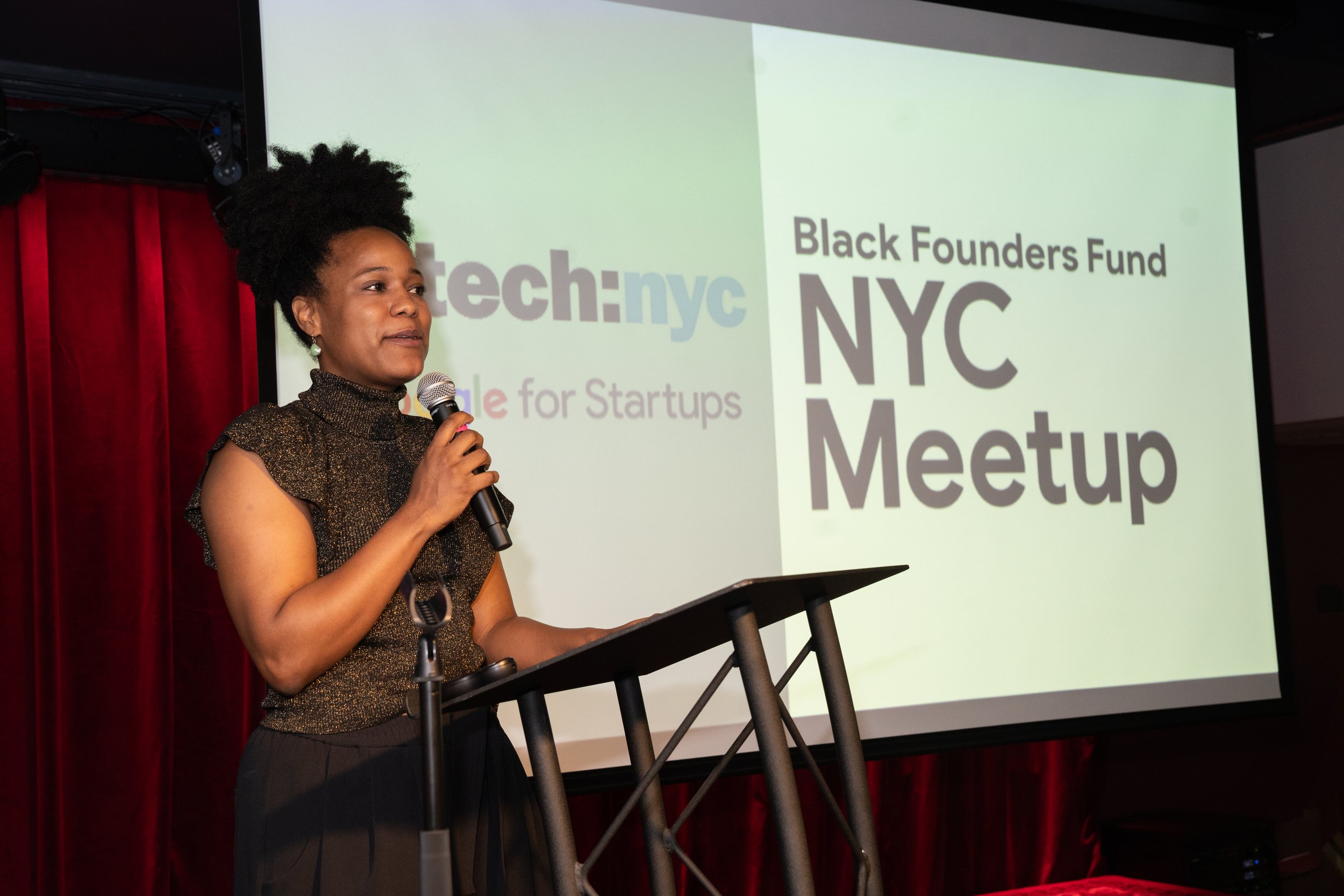
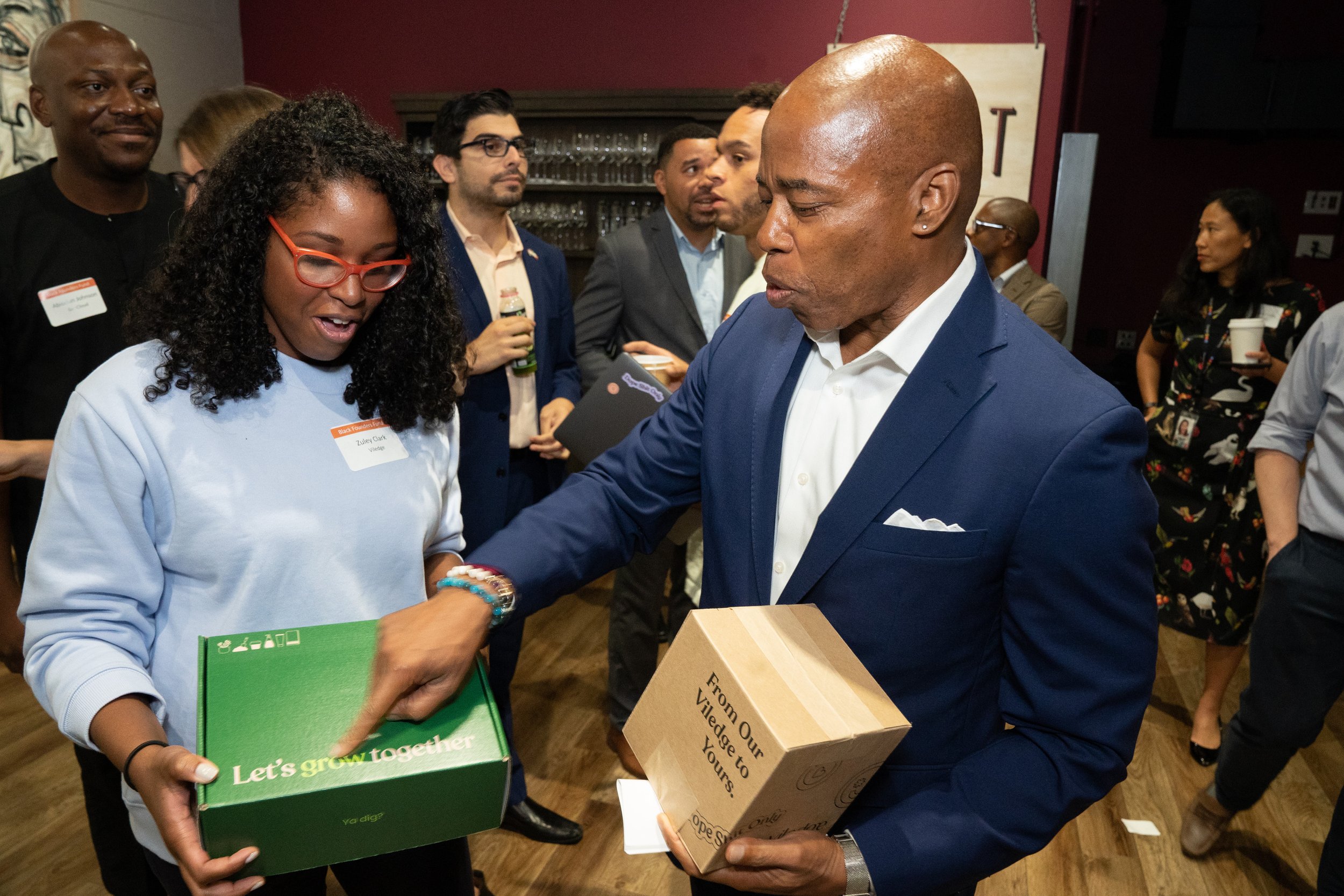
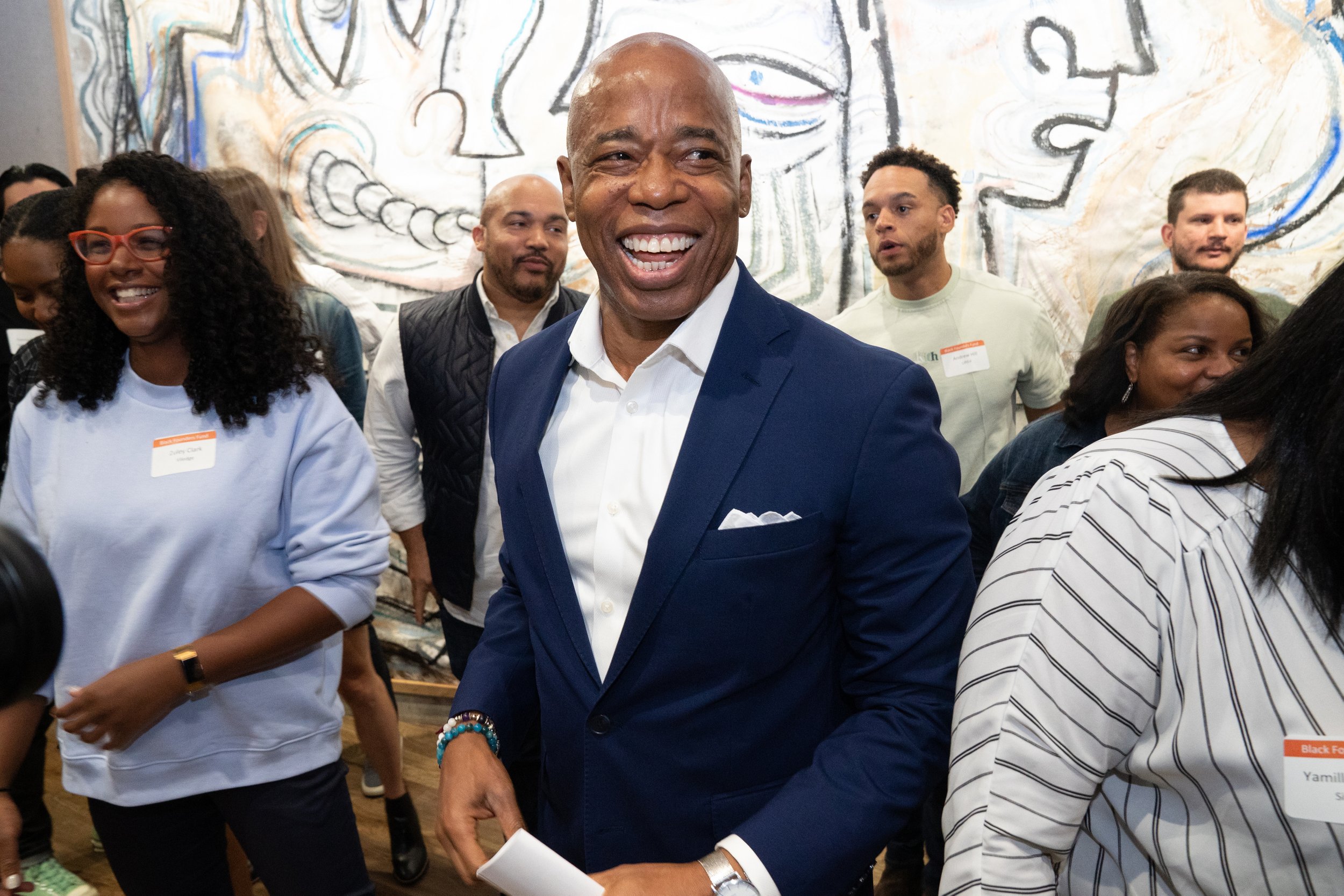
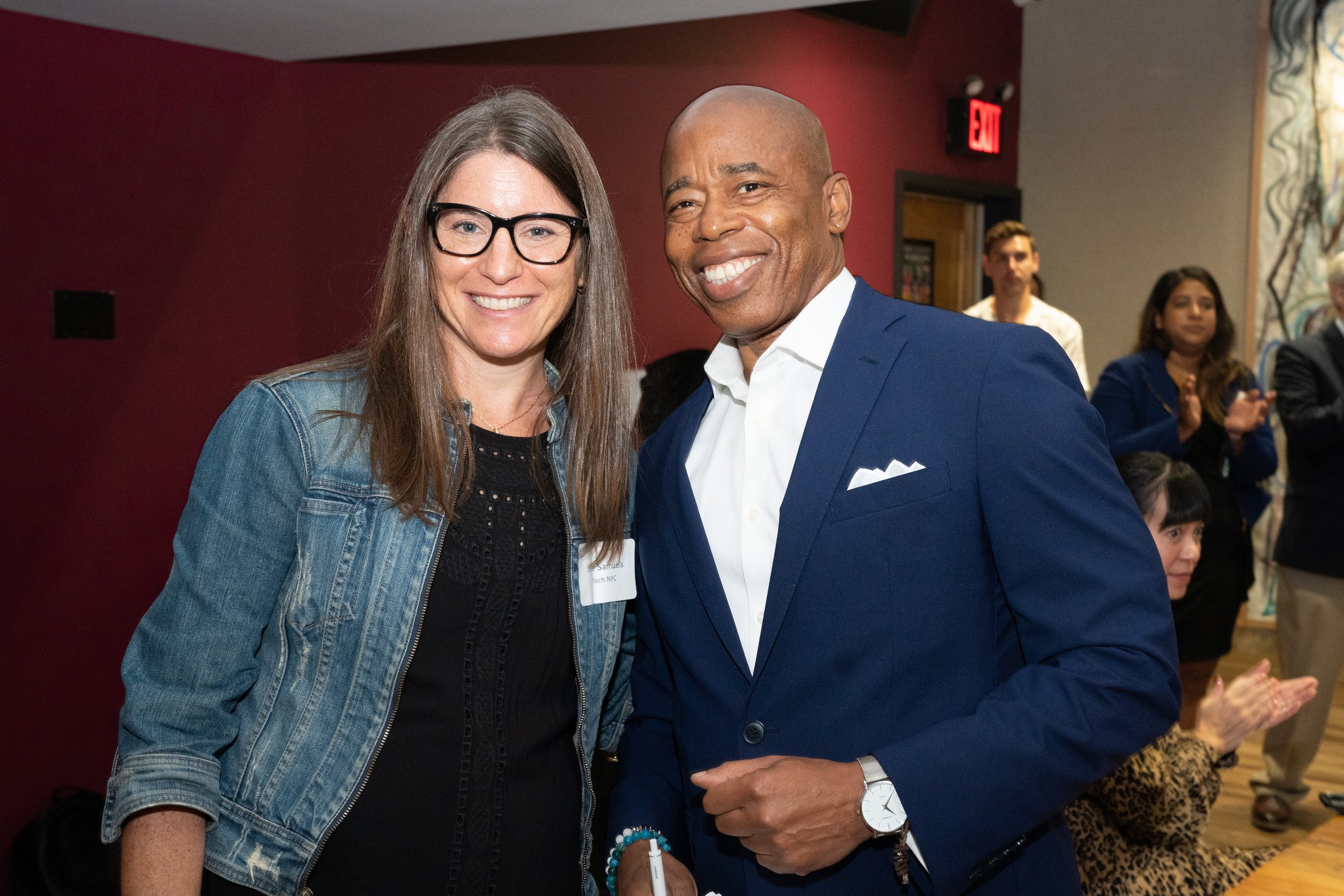
“And if we do it in New York, it's going to cascade across America. The way goes New York, goes America. The way goes America, goes the entire globe. I cannot be more excited than where we are now.”
Established in 2020, the Google for Startups Black Founders Fund has awarded $16 million toward making a resounding impact to help Black-led startups secure funding, strengthen communities, and create generational change.
For this month’s Companies to Watch, we talked with some of the New York awardees of the Black Founders Fund on what they’re building and how the sector can better support entrepreneurs of color.
COI ENERGY
What does your company do?
COI Energy founder and CEO SaLisa L. Berrien: We are on a mission to eradicate energy waste in buildings and repurpose the waste for good. We call that “kW for Good.” For every kilowatt saved on the COI Optimizer, a portion of it goes to help underserved communities get equitable access to clean energy.
A question we love to ask every founder: why New York?
SLB: Opportunity and big problems to solve with the oldest electric grid in the country.
You’ve been working in the energy and clean tech space for some 25 years, but you decided to become a first-time founder with COI Energy in 2016. What made you want to build your own company?
SLB: Working in customer-facing roles my entire career, I had firsthand knowledge of customer desires. The way we were delivering solutions to customers was fragmented. Over the years, I had customers joke and say I should start my own company because I would be upfront with them about what I could or could not do. They always appreciated the honesty. I felt we could do things better by starting with customer delight or as I call it, the platinum rule: do unto customers as they would have you to do unto them.
If we address customer concerns, educate them on opportunities, and empower them to take advantage of such opportunities, then they will be able to make an impact for their business, the community, and the environment.
One of the core benefits of your tool is that it detects energy waste. If I'm a business owner — or even a homeowner — who has electricity bills to pay, how do I know how much energy is being wasted?
SLB: The COI Optimizer services businesses. It uses machine learning and artificial intelligence to understand the company’s energy behaviors and patterns. It also identifies potential anomalies with demand spikes and dips and shows flexibility right on the platform. The business owner is notified of these insights and given the opportunity to automatically or manually adjust usage patterns before waste occurs.
Did the pandemic change energy consumption patterns? How did your platform respond?
SLB: It did. Many businesses without our platform found that their usage did not drop much because they did not realize most systems were still operating at close to full capacity. They did not have a clear line of sight into their usage until after they received the utility bill. Our platform provides these insights in real-time to avoid any waste.
What’s one high-impact step the tech sector could take to better support Black founders and other entrepreneurs of color?
SLB: They should use the Google for Startups playbook. They are providing the real support that founders need to accelerate their businesses — marketing, technology, and financial support, to name a few. They also are shining the light on the Black founders so others know they exist and know the value they are delivering by solving some of the biggest global challenges of our time.
What does the Black Founders Fund investment mean for how you’ll be able to grow the business?|
SLB: It means equitable access to acquire talent and scale.
Okay, some rapid fire questions. First: where do you get your favorite pizza slice?
|SLB: Joe’s Pizza on Bedford Ave. in Williamsburg.
What’s the best place in New York for a coffee or lunch meeting (remember in-person meetings)?
SLB: Bluestone Lane in Tribeca.
What’s your favorite remote work office hack?
SLB: Using the telecom provider phone app so customers see my office number on their caller ID.
What’s one new thing you’re doing to stay connected while everyone works from afar?
SLB: Engaging in virtual networking sessions and hosting virtual all-hands meetings with my team.
WHOSE YOUR LANDLORD
What does your company do?
Whose Your Landlord founder and CEO Ofo Ezeugwu: Whose Your Landlord is empowering and informing the rental community through housing reviews, insights, and literacy content. In turn, we use data and predictive analytics to help owners and operators improve resident retention, make more data-driven capital improvement decisions, and hasten their lease up process by enabling them to be recognized as a top home provider in their respective communities.
A question we love to ask every founder: why New York?
OE: New York is the real estate capital of the world. When things catch on here, they inform the entire country, and in turn, inform the world. So for us, New York has made a ton of sense in building our company because we have the power to affect so many in a powerful way.
There are a lot of websites and tools out there for New Yorkers looking for their next apartment — and we trust some more than others. What is WYL offering that other platforms haven’t?
OE: WYL interviewed hundreds of residents and home providers to create a platform that serves both sides. Our goal is to create better relationships between tenants and landlords — or who we’d call, residents and home providers. We provide resident surveys that touch on everything from responsiveness of the home provider, to respect, condition of property, safety, and more. Our data analytics dashboard then helps home providers form an operational and marketing perspective. Our analytics have helped companies increase the value of their portfolio because they become more efficient and that helps the residents.
COVID-19 really impacted the housing market in New York City, and we’re still under an eviction moratorium until January of next year. What support do tenants most need right now? What about landlords?
OE: Renters make up nearly 40 percent of all US households and, collectively, 6 million of them owe $20 billion in back rent. This has been devastating for low-income families, women, and people of color. Residents and home providers alike need the $46 billion in rent relief aid committed by the federal government to be disbursed. Right now, a little over 11 percent of it has been so far, according to the New York Times.
If you could run the Dept. of Buildings or be in charge of housing/rent policy in New York City for a day, what’s the most important thing you’d do?
OE: If I could run housing policy in NYC for the day, I’d have to selfishly tell everyone to make an account on Whose Your Landlord (wyl.co) and provide us your insights. I’d do this because once we have all the real insights in hand, we can make more data-driven decisions on issues from affordable housing to discimination and improvements in safety measures.
What’s one high-impact step the tech sector could take to better support Black founders and other entrepreneurs of color?
OE: Fund them. Receiving less than 2% of VC funding a year literally boxes Black founders (and Black people) out of the future of the world: technology.
What does the Black Founders Fund investment mean for how you’ll be able to grow the business?
OE: The Black Founders Fund check came at an integral time for WYL. We’re in the midst of fundraising now, and that’s an arduous process that requires some leeway and additional support to sustain runway, fulfill customer needs, and pay the team.
Okay, some rapid fire questions. First: where do you get your favorite pizza slice?
OE: Brooklyn Pizza Crew. I just tried it two weeks ago — fire.
What’s the best place in New York for a coffee or lunch meeting (remember in-person meetings)?
OE: The Brooklyn Heights Promenade. Those views of the Brooklyn Bridge and Manhattan are endlessly inspiring. There’s so many shops and restaurants in this area, and I just love outdoor meetings in that area.
What’s your favorite remote work office hack?
OE: Slack huddles. I’m a voice note king in my text messaging life, so when Slack brought the huddle into the game, that made people who like to use their voice early and often, like myself, very happy.
What’s one new thing you’re doing to stay connected while everyone works from afar?
OE: Now that folks are getting the vaccine, I’ve been hosting more intimate events at my apartment, and I’ve been going to a lot more of the same kinds of events at other friends’ spots. And of course, traveling (as long as we’re doing it safely) never goes out of style.
FUNDBLACKFOUNDERS
What does your company do?
FundBlackFounders founder and CEO Renee King: We’re the new Friends, Family, Fans & Funds for Black founders empowering everyone to fund Black-owned businesses from start to profitability. We're an online version of Tulsa's ‘Black Wall Street’ embodying the entrepreneurial spirit and community that made them successful.We’re leveling the playing field where any Black founder can start a business with access to the capital they need to start, build, and grow.
A question we love to ask every founder: why New York?
RK: I’ve actually asked myself this question a lot during the pandemic. I was born and raised in the Bronx, so everything I do and how I move is very ‘New York state of mind’. But other parts of the US also seemed really appealing during the pandemic. I choose to stay because now is the time and opportunity to rebuild New York to not only be diverse in its people but also in who owns our neighborhoods, our businesses, real estate, etc. That's my “why New York”. I am here to make New York City more diverse when it comes to who owns this city.
There’s obviously still a lot of room for improvement when it comes to diversity in venture capital (and tech more broadly). What made you want to start your own company working on that issue?
RK: When you really examine the lack of diversity in venture and tech, it starts at access to funding to build businesses, create venture funds, etc. It starts from day one of an entrepreneur having an idea. Black founders start businesses with 300 percent less startup capital than our white counterparts. For us, a friends and family capital round is non-existent. So this creates barriers in what we are able to create, how long it takes us to create it, launch it, and grow it.
Diversity of founders brings about diversity in innovation. I am deathly afraid of living in a society where we only have access to technological innovation built by and for one specific demographic in mind. We all should. We need diversity in thought and innovation so all problems can be addressed by solutions that work for diverse populations — not just white men.
And, of course, venture capital is just one funding option. Crowdfunding is another — why are you focused on that as an alternative?
RK: FundBlackFounders is focused on crowdfunding as an alternative because it is a pathway to extending Black entrepreneurs' friends and family circle nationally and eventually globally. Systemic barriers limit Black founders’ ability to raise a traditional friends and family round via their immediate network, but when the whole world becomes your friend and family, imagine the possibilities and power in that.
We’re leveling the playing field where any Black entrepreneur can get access to the capital they need in order to build the innovations our world needs — a place where we all can come together and FundBlackFounders!
Are you a first-time founder? What’s it been like building a new company — and during a global pandemic, no less?
RK: I’m actually a second-time founder. I started FundBlackFounders after witnessing an angel investor shame a group of Black entrepreneurs for not being able to raise friends and family capital. That was a critical moment in time for me where I decided: I'm going to fix this problem and make sure every Black entrepreneur has access to the funding they need to start or grow business ventures.
As a company we have thrived during the pandemic because our business fills a need that existed before the pandemic. The pandemic just further exacerbated the need, which led to tremendous demand for our services. As a newbie on the funding block, we’ve been able to fund over 70 entrepreneurs with more than $1.4 million in capital.
What’s tough about building during a pandemic that has disproportionately affected your community is that there is a lot of loss — of family members, friends, loved ones. You have to compartmentalize your emotions to remain focused on the big vision of rebuilding our communities with the hope we do not ever have to experience any of this again.
What’s one high-impact step the tech sector could take to better support Black founders and other entrepreneurs of color?
RK: Be like Google! Google showed up big time and with a level of intentionality that needs to be a case study for all big tech. What Google did right was to give [head of Google for Startups, US] Jewel Burks Solomon the resources and space to build an impactful solution. That's a formula that works and other companies should replicate and build on that.
And now Google for Startups’ Danny Navarro is about to crush that with LatinX founders. Listen and get excited for the diverse innovation that is about to take over these white tech spaces and make a tremendous impact on the world.
What does the Black Founders Fund investment mean for how you’ll be able to grow the business?
RK: The problem we’re solving is not small. We’re on a mission of fueling $100 million or more in capital to Black founders. The Black Founders Fund investment and support resources helps us grow into this major funding alternative so we can solve this problem at scale.
The investment is also a humbling milestone for us because it’s validation that Google believes in us and is stepping up to help us on our journey to build this platform that will birth and grow more Black founders. Having visionaries at Google believe in your vision is so motivating and reassuring because we now have a powerful ally with us on this journey.
Okay, some rapid fire questions. First: where do you get your favorite pizza slice?
RK: Zurilee Pizza in Brooklyn is wood-fired and hand-tossed yummy goodness — and #BlackOwned.
What’s the best place in New York for a coffee or lunch meeting (remember in-person meetings)?
RK: I prefer late afternoon meetings — and my favorite spot is Ode to Babel. It’s a cool, low-key cocktail bar and lounge in Crown Heights that feels like home. #BlackOwned
What’s your favorite remote work office hack?
RK: My pop-up green screen! My background for video calls is always a mess, so this screen has saved my life so many times and hopefully, its money green color also hypnotizes viewers to open their wallets and fund Black founders.
What’s one new thing you’re doing to stay connected while everyone works from afar?
RK: I’m hosting Viledge box-themed team building events. Viledge’s employee gifting boxes are so much fun and, of course, the icing on the cake is that all the products in the boxes are Black-owned. #BlackOwned #fundBlackfounders
LIFTED
What does your company do?
LiftEd co-founder and CEO Andrew Hill: LiftEd provides evidence-based instructional planning, daily data collection, learning analytics, and family engagement software designed for special education professionals to accelerate learning outcomes for students with moderate to severe learning disabilities in the US.
We care deeply about expanding access to high-quality, evidence based teaching and therapeutic intervention practices for a historically underserved student population — 8 million+ students receiving special education services between ages 3 and 22 across the US.
A question we love to ask every founder: why New York?
AH: I was born and raised in Long Island but moved to Dallas as a teenager. But in 2019, we were doing most of our business on the East Coast — largely in New Jersey schools districts — where my co-founder Dr. Joanne Hill Powell and LiftEd’s first employee Heather Peltack are based.
Plus, my fiancé got a job opportunity at Rent the Runway in NYC she couldn’t pass up — their offices are soon to open in Dumbo, and LiftEd just received a grant from WeWork’s Black Founders Fund to cover our office expenses at WeWork Dumbo. The perfect alignment.
You started off working in tech consulting, but what made you decide to make the jump into founding your own company?
AH: Dr. Powell and I launched LiftEd in 2016 after noticing the lack of centralized data in the field of special education, thus inhibiting students educational outcomes and causing teachers to spend more time sorting through materials across different platforms, rather than focusing on individual students' needs. Joanne and I combined our prior backgrounds, mine in tech, hers in education, to create LiftEd.
In 2020, you raised a seed round from edtech investors and angels (and now you’ve added Google for Startups’ investment). But then, of course, COVID-19 also hit, completely upending school and home lives for a lot of people. Did the pandemic change how you plan to use the new capital or support your users?
AH: When the pandemic forced school closures and a rapid transition to remote school operations, it posed tremendous challenges for educators, families, administrators, and students alike, but was especially detrimental to our most vulnerable learners. For the 8 million+ children and youth with special learning needs across the US, their parents continue to be left with a daunting question: How is my child supposed to sit for eight hours a day at a computer? Without in-person classes, will my child regress and fail to thrive? What about my job?
The shift to online — and now hybrid — learning has exacerbated the disparities imposed by race and class for eligible children with Individualized Education Plans, or IEPs. The pandemic has accelerated the solutions we had on our product roadmap to empower parent engagement — as support agents but now also as instructional aides as their children learn at home.
What’s one high-impact step the tech sector could take to better support Black founders and other entrepreneurs of color?
AH: More money invested in Black and brown founders.
What does the Black Founders Fund investment mean for how you’ll be able to grow the business?
AH: It means more capacity to hire. We’ll be able to bring on a product designer to improve the product both for our original customers — schools and school districts — and now directly to special educational teachers, clinicians, and other professionals. We’ll also be able to add a growth marketer.
Okay, some rapid fire questions. First: where do you get your favorite pizza slice?
AH: A friend of mine, Rob Guimond, owns Public Display of Affection in Brooklyn. A must have!
Where do you get your favorite bagel?
AH: Bergen Bagels.
What’s the best place in New York for a coffee or lunch meeting (remember in-person meetings)?
AH: I love Charley St. in Nolita.
What’s your favorite remote work office hack?
AH: This is not really a hack, but a simple routine: Get up (ideally at the same time every day; for me somewhere between 5:30-6:30), 10-15 min stretch, 10-20 min meditate, exercise, shower, and right to the desk. Movement gets endorphins flowing and meditation allows me to sit with my feelings going into the day. The longer I wait to get started, the more I fill my time and my head with the millions of things I have to do on any given day.
What’s one new thing you’re doing to stay connected while everyone works from afar?
AH: Scheduling my personal life as rigorously as I do my work life. I set up calls with my friends and families and put them on the calendar, particularly on Mondays and Fridays. I feel like it’s a great way to start and end the week with a positive spirit.
Event photography by Don Pollard




